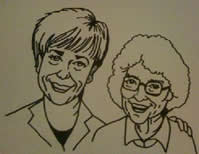Three weeks ago, my mother had what appeared to be a stroke, followed by a TIA, and a urinary tract infection. She was taken by ambulance to the nearest hospital, which in the case of an emergency is required by law. Her primary care physician was not on the staff at that hospital. Due to her frail condition and lack of a private room (my mom’s request) at her regular hospital, we did not move her. After she had been staying in the hospital for two weeks, I arranged for her transfer to a skilled nursing community for rehabilitation. I must admit, I felt uneasy and alone because her primary care physician was not in command of her health care.
When you move your loved one to a skilled nursing community for rehabilitation or a long-term stay, be prepared for the possibility that his or her primary care physician will not, or will not be able to, follow them. Your loved one will be giving up a long-term emotional and psychological relationship with his or her physician. Most of my clients don’t seem to be concerned with keeping their loved one’s physician. You should be concerned!
Luckily, my mother was in a community where the Medical Director was on site every day. When she did not see my mother, the doctor had a nurse practitioner who would follow up with her patients. Some of the physicians in other communities do not visit the patients more than once a week. Many of the physicians on nursing home staffs visit less than once a week. The new doctor’s routine, bedside manner, and educational background may not be in accordance with what your loved one is used to, resulting in patient dissatisfaction.
As part of my consultations, I always tell my clients who the Medical Director is and with what hospital they are affiliated. I also check the physicians’ backgrounds through the Illinois State Medical Society and make my clients aware of the findings. There is also a chance that the Medical Director will not be the physician assigned to your loved one. Instead, you will be presented with a list and asked to choose a physician you know nothing about.
Most of the nursing homes will allow a senior’s doctor to become credentialed for visitation purposes. It involves completing paperwork including presentation of the doctor’s malpractice insurance and license. However, most doctors do not choose to seek privileges at nursing homes and other such facilities, so keep in mind that health provider changes could be a major challenge as you seek placement/care for an older loved one.
This is yet one more reason why I firmly believe in Andrea Donovan Senior Living Advisors and the importance of our client services. Our systematic research and personal and professional experience with senior placement options enable clients to navigate difficult family decisions with detailed, timely information and reliable, cost-effective support.

 Chicago Senior Living Advisors Blog
Chicago Senior Living Advisors Blog

